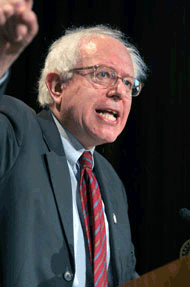
Money in America — who owns and controls wealth — has been a dead issue in Congress since the New Deal petered out in the 1960s. But the growing gap between rich and poor has put the topic back on the agenda for the new Democratic majority, and Vermont Senator-elect Bernie Sanders says he will propose an investigation of money and power when he joins Ted Kennedy’s Health, Education, Labor, and Pensions Committee in January.
Though technically an independent, Sanders will caucus with the Democrats in the Senate, as he has in the House since he was first elected as Vermont’s single representative in 1990. The Dems’ one-vote margin should give him considerable leverage: Nobody seriously thinks he would routinely vote with the GOP, as fellow independent Joe Lieberman might well do on some issues, but Sanders is also not a party-line man and in the past has joined Republicans on votes against NAFTA, trade with China, and other issues.
When I stopped by his office last week — still his old digs in the Rayburn House Office Building — Sanders, in his standard sport coat and slacks, first excused himself to make a quick phone call: “Hello,” he said, “this is Senator-elect Bernie Sanders. Would Senator Kennedy have a little time this afternoon?” He was still getting adjusted, he confessed, to being part of what he calls the “House of Lords.” He demurred on my questions about Robert Gates, Bush’s nominee for secretary of defense (“I don’t know anything about him”) and the Murtha-Hoyer leadership fight among his former colleagues in the House. Instead, he insisted on talking about wealth.
Mother Jones: What’s your first-100-days agenda?
Bernie Sanders: The first thing I want to do is to force reality onto the floor of the Senate so that we can end this stupid discussion about how great the American economy is. The economy is not great. The economy is a disaster for the middle class.
Second, I want to focus on an issue that is almost never talked about on the floor — that is the power of big money. What are the moral implications? What do these people do when they have tremendous amounts of money? They use that money to perpetuate their own wealth and their own power. Every day, Congress works on behalf of big-money interests.
Third, I want to take a look at some of the good things that are being done around the rest of the world that are almost never discussed in the United States. How often is it discussed that the American people work the longest hours of any industrialized country in the world? The two-week paid vacation is almost a thing of the past; meanwhile in Europe you get four to six weeks vacation, and maternity leave with pay. We don’t know about these things. I want to take a look around the world and see what workers are receiving, and compare that to the United States — from an educational point of view.
MJ: How would you force these discussions? Through committee hearings?
BS: Yes — I was very fortunate in that [Senate Majority Leader] Harry Reid gave me the committees I wanted. I am on Kennedy’s Health, Education, Labor, and Pensions Committee. I am going to be on the environmental committee, with Barbara Boxer, which is what I wanted. Also the veterans committee, the budget committee, and the energy committee; Harry gave me what I wanted.
MJ: You talk about big money. But nobody has seriously looked at this since Wright Patman, the old Texas populist and antitrust crusader who chaired the House Banking Committee for, what, 40 years?
BS: That’s right. Patman produced a book on concentration of bank ownership. We can do things like that—take a hard look at who owns America.
MJ: You’d do it through Kennedy’s committee?
BS: Yes. We would demand studies, raise questions, get the word out.
MJ: Do you think that Americans are getting nostalgic for a sort of FDR Democratic Party?
BS: No. I think that what this election was about was a rejection of the disastrous policies of Bush, Cheney, and the Republican leadership. It was the war in Iraq. It was incompetence. It was Katrina. It was bad public policy, but it certainly was not an embracing of an alternative philosophy, because in fairness the Democrats are all over the place, and what I have said to the Democratic leadership and will say publicly every chance I get, if the Democrats — having this opportunity no one thought they would have — if they do not move boldly and decisively and make a difference in the lives of ordinary Americans, they’re going to be in a lot of trouble.
MJ: Are you a Democrat, an independent, or a socialist?
BS: You can call me anything you want. I won with the label “Independent” next to my name. If you ask me, “Are you an independent democratic socialist?” — yes, I am. But then we have to talk about what that means.












